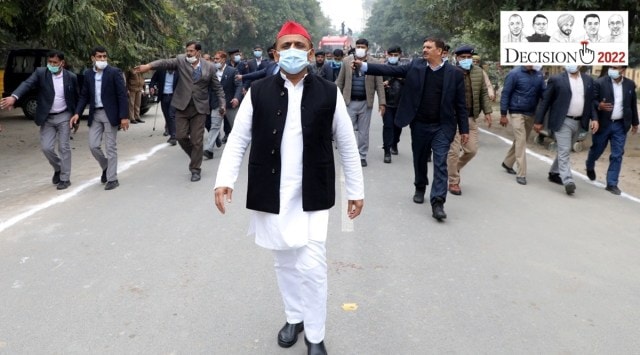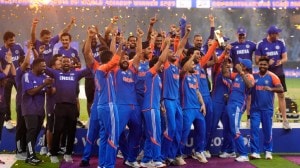Asad Rehman is with the national bureau of The Indian Express and covers politics and policy focusing on religious minorities in India. A journalist for over eight years, Rehman moved to this role after covering Uttar Pradesh for five years for The Indian Express. During his time in Uttar Pradesh, he covered politics, crime, health, and human rights among other issues. He did extensive ground reports and covered the protests against the new citizenship law during which many were killed in the state. During the Covid pandemic, he did extensive ground reporting on the migration of workers from the metropolitan cities to villages in Uttar Pradesh. He has also covered some landmark litigations, including the Babri Masjid-Ram temple case and the ongoing Gyanvapi-Kashi Vishwanath temple dispute. Prior to that, he worked on The Indian Express national desk for three years where he was a copy editor. Rehman studied at La Martiniere, Lucknow and then went on to do a bachelor's degree in History from Ramjas College, Delhi University. He also has a Masters degree from the AJK Mass Communication Research Centre, Jamia Millia Islamia. ... Read More
Minister vs ‘our boy’: For Karhal, choice is easy
Even among non-Yadavs, and despite appeal of PM ration scheme, SP chief stands tall in bastion
 Samajwadi Party National President Akhilesh Yadav along with his uncle and party's national general secretary Ram Gopal Yadav on way to file his nomination from Mainpuri Karhal seat. (Express photo)
Samajwadi Party National President Akhilesh Yadav along with his uncle and party's national general secretary Ram Gopal Yadav on way to file his nomination from Mainpuri Karhal seat. (Express photo)The BJP may have sprung a surprise by fielding Union Minister of State S P Singh Baghel from Karhal against Samajwadi Party chief Akhilesh Yadav. But that’s where the surprise ends, as per voters of this Yadav bastion. “Local boy” Akhilesh, they say, is up for a huge win.
Karhal is located just 4 km from SP patron Mulayam Singh Yadav’s village Saifai which, with its wide roads, multi-specialty hospital and colleges, is a shining example of what being a political titan’s home can mean.
SP flags are fluttering at Jain Inter College in Karhal, where “Netaji” (as Mulayam is called) studied and briefly taught. Among a group of Class 12 students playing cricket there is Sanjay Yadav. Waiting for his turn to bat, the 18-year-old says: “Who knows Baghel here? Even a child here will tell you their leader is Akhilesh. Bhaiyya’s popularity is unmatched. Yogi Baba (Chief Minister Yogi Adityanath) too would lose from here.”
 Samajwadi Party founder Mulayam Singh Yadav with his son Akhilesh Yadav at the SP party office in Lucknow. (Photo: PTI)
Samajwadi Party founder Mulayam Singh Yadav with his son Akhilesh Yadav at the SP party office in Lucknow. (Photo: PTI)
Mulayam was appointed as an assistant teacher at the inter college in 1963. Around the same time, he won as MLA from neighbouring Jaswant Nagar, which like Karhal and nearby areas has a sizeable Yadav majority. Since then, this has remained a Mulayam family fiefdom.
While Mulayam is the MP from Manipuri, his brother Shivpal Yadav, who is back in the family fold, is contesting this time from Jaswant Nagar on the SP symbol.
There are 1.40 lakh Yadavs in Karhal, with Shakyas (also OBC) making up around 60,000, besides 25,000 Brahmins and Thakurs each, 40,000 Dalits and 15,000 Muslims. On paper, should the non-Yadav OBCs, upper castes and Dalits vote together (which is what the BJP is counting on), Karhal could be anybody’s game.
However, even in villages such as Nagaria, with barely any Yadav voters, Akhilesh is ahead, despite the lingering Modi wave and the popularity of the Prime Minister’s Garib Kalyan Yojana that has meant free rations since the Covid pandemic began.
Besides, the SP has got its maths right, with alliances that could bring it votes of non-Yadav OBCs who, apart from Shakyas, include Sainis, Kushwahas, Pal and Prajapati. Akhilesh as candidate from Karhal is expected to boost the SP in the entire Yadav belt comprising Etah, Etawah, Mainpuri, and Kannauj districts, and 20 seats.
Ram Murti, 60, a Nagaria resident who belongs to its dominant Shakya community, says, she is happy with the BJP government, primarily because of the ration scheme. However, she says she will vote for Akhilesh. “He is our local.”
Heera Lal, 70, a Jatav voter and a farmer, says he will also back Akhilesh, though he has always voted for the BSP. “A vote to anyone else is a vote wasted here,” he says.
For Heera Lal, the biggest failure of the BJP government has been its failure to tackle stray cattle, whose numbers have surged since the Adityanath regime cracked down on illegal slaughter. “If the CM had controlled them, every farmer would have voted for the BJP,” he says.
Heera Lal’s brother Moti Lal, 62, says Baghel might be a Dalit but he has no chance here. “Bekaar mein lade hain yahaan se (He is fighting here for no reason).”
In neighbouring Ranipur village, where there is a sizeable population of Pal (OBC) and Banjara (ST) communities, the sentiment is the same – “Gadh hai toh jeetenge kaise nahin (Why won’t Akhilesh win from what is his bastion)?”
Deepti Kumari, 19, among the few women in Ranipur to have studied till Class 12, and now doing graduation, says Akhilesh has put Karhal on the country’s map. “The BJP has fielded a minister from here only because of Akhilesh Yadav. He gave the youth laptops. He also gave pension to my mother. The woman of the house getting Rs 500 meant she could spend it the way she wanted,” says Deepti, a Prajapati by caste.
Though traditionally BJP supporters, the Brahmins sense the direction the wind is blowing. Shiv Kumar, 60, an affluent farmer of Ranipur, says: “Who can defeat a national leader? We are voting for a probable CM.” On the other end of the caste spectrum from Heera Lal, Shiv Kumar is also frustrated with the government’s lack of action on stray cattle.
At Karhal town, local BJP leader Vijay Kant Dubey tacitly admits Akhilesh will win, though with a narrow margin. “It will be around 15,000-20,000 votes. People are scared to say they will vote for the BJP, but they will,” says Dubey.
But, even without Akhilesh in the race, Karhal has been out of the BJP’s reach. After the SP was founded in 1992, the seat has been won by it five times, losing just once, in 2002. Local leaders say the vote in 2002 too was for the MLA and not the BJP.
The BSP has fielded local leader and former district chief Kuldeep Narayan, but nobody gives him much of a chance. On Wednesday, the Congress announced it will not field candidates against Shivpal and Akhilesh Yadav, out of “political courtesy”.
The principal of the Jain Inter College, Yadhveer Narayan Dubey, is a Brahmin. The vote in Karhal, he says, is not about caste. “See, the whole state votes based on caste, but not here. People will vote for Netaji’s son and a former CM.”
2012:
Sobaran Singh Yadav, SP: 46.90% votes
Jaiveer Singh, BJP: 31.22% votes
2017:
Sobaran Singh Yadav, SP: 49.81% votes
Rama Shakya, BJP: 31.45%



- 01
- 02
- 03
- 04
- 05





























